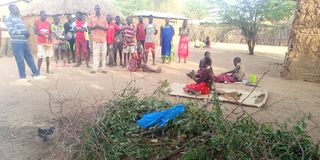Government declares total war on bandits in North Rift

Relatives of Erionga Emase, the latest victim of the insecurity in Turkana sit next to his grave as they are consoled by neighbors after his burial. Emase who was killed on Satuday night was the third man in the family to be killed by bandits.
The government has declared total war on bandits in the North Rift region following a resurgence of highway banditry and livestock theft in Turkana, West Pokot and Baringo counties.
Armed civilians in the region have been given 30 days to voluntarily surrender any weapons they are holding.
The regional security team came up with names of notorious bandits operating in the border areas, including their commander, and police are looking for them.
Rift Valley Regional Commissioner Maalim Mohammed attributed the insecurity on the border of the three counties to illegal firearms in the hands of civilians.
No single PSV on the road
While on his way to Kainuk from Kitale on Monday for meetings with county security teams from Turkana and West Pokot and border residents and their leaders on tackling banditry, Mr Mohammed was disturbed that he didn't see a single public service vehicle from Makutano in West Pokot to Kainuk in Turkana.
"Lack of public service vehicles on a critical A1 road that the government spent billions of shillings to rehabilitate so that it facilitates trade and transport between Kenya and South Sudan signals that motorists are afraid of being attacked by armed bandits," he observed.

Rift Valley Regional Commissioner Maalim Mohammed (in front) with West Pokot County Commissioner Apollo Okello (Left) and deputy county commissioners from the region outside Mtell Hall in Kapenguria, West Pokot County on Tuesday April 17.
Mr Maalim singled out an area near the South Turkana National Reserve gate, also referred to as the KWS area, as a hotspot for highway bandit attacks.
"There are armed bandits hiding under the pretence of being herders that have established two kraals within the national reserve only to terrorise motorists by attacking at will, injuring and robbing them and sometimes killing them," Mr Mohammed said.
Local leaders have called for investigations into the operations and management of the Kenya Wildlife Service (KWS) office in the national reserve that was not represented at the security meeting.
Series of attacks
Last week, police officers from the Kalemngorok Police Station who were on patrol on the road near the KWS hotspot were ambushed and one was injured in a fierce exchange of fire.
Last month, one person was killed and two others injured when bandits attacked a matatu in the same area.
On Sunday, bandits dared the government further by attacking and injuring Kaakong Assistant Chief Patrick Longiti Achila, who was in his uniform, and two other people on a motorbike headed to Kainuk.
Mr Mohammed was shocked to hear that bandits had ambushed an unarmed 80-year-old man, shot him dead and driven away all his 30 goats.
"To secure the KWS hotspot area and assure nearby villages of their security, I am giving Pokot herders who have established two kraals in South Turkana National Reserve a seven-day ultimatum to go back to their villages in Tiaty, Baringo County. We are aware where they came from due to drought. There is pasture after it rained," Mr Mohammed said.
To beef up security along the borders, officers from the General Service Unit, Rapid Deployment Unit, Anti Stock Theft Unit and the Kainuk Police Station will be deployed.
Volunteer information
Locals have also been asked to volunteer information about planned attacks for swift response.
Chiefs and assistant chiefs of administrative units along the borders risk losing their jobs if raids are planned in their areas and stolen livestock are not recovered.
They were told to ensure peace committees and groups of elders in villages are active so that any information about planned attacks is promptly shared.
"The only sustainable solution to banditry is embracing education for a better future, not letting children learn how to use illegal firearms to become bandits who only steal and kill," Mr Mohammed said.
He told leaders pushing for the hiring of police reservists that this will only be possible after thorough vetting, as most of the reservists used their guns to facilitate bandit attacks.
Government measures welcomed
Turkana South MP James Lomenen welcomed measures taken by Mr Mohammed to tackle insecurity in the area, saying that relative peace would boost the economy of Kainuk.
He said that the town relies mainly on motorists who stop over for food, drinks and accommodation.
Some residents have farms along the River Malimalite where they plant vegetables and fruits for sale, while others sell firewood and make charcoal.
"I request the regional commissioner to ensure that when the bandits pretending to be Pokot herders leave their kraals in the national reserve, they should be disarmed. The firearms can be [used] for attacks along the border of Turkana and Baringo counties," Mr Lomenen said.
He said that Pokot herders are free to graze anywhere in Turkana so long as they respect the rules of existing pasture committees.
Turkana South parliamentary seat aspirant Philip Aemun questioned the relationship between the bandits who, he said, are pretending to be pastoralists in a gazetted national reserve and the Kenya Wildlife Service officers.
"Why is it easy for bandits to roam freely within a gazetted area, live there and feed on wildlife? Worst still, they attack vehicles at the gate of the national reserve," Mr Aemun said.





